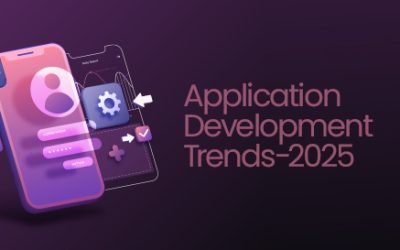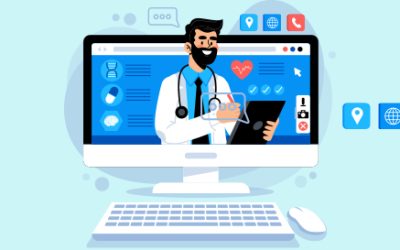Medical application development has reshaped the way patients and users interact with healthcare services. These creative applications have surpassed traditional barriers, empowering individuals to take charge of their health and well-being like never before. With the potential to enhance the patient experience and bridge the gap between patients and healthcare providers, medical apps have emerged as indispensable tools in the modern healthcare ecosystem.
Medical apps offer a unique level of accessibility to health-related information, allowing users to become more informed and proactive in managing their medical conditions and overall wellness. Gone are the days of waiting in long queues at healthcare facilities or enduring the frustration of missed appointments. With mobile apps, patients can effortlessly schedule appointments, receive timely reminders, and even consult with healthcare professionals from the comfort of their homes. Good apps can help with business growth, particularly in healthcare settings, by promoting brand recognition and creating a true sense of value for the user.
How Healthcare Apps Are Changing the Delivery of Care
Today, healthcare apps are changing the care delivery model. Robust and well-designed apps are helping to meet the needs of patients, physicians and even insurers. They improve access to medical services by connecting patients to medical professionals who can provide consultations for non-life-threatening health issues. This in turn eliminates wait time for patients, travel time, and rescheduling delays. These apps also help patients make better health decisions by providing real-time feedback.
How Medical Apps Can Enhance the Healthcare Experience
- Access to Information – Medical apps offer users easy access to a wealth of information about medical conditions, treatments, medications and preventive care. This is beneficial in situations wherein the user is experiencing a medical issue and has limited attention or mobility. By using healthcare apps, chronically ill patients can keep track of their own health as well as connect with their healthcare providers regarding any concerns. With an easy-to-use wellness app, patients can set healthcare goals and track their progress.
- Remote Monitoring – Medical apps facilitate remote monitoring of patients’ health conditions. Through connected devices or wearables, healthcare providers can track vital signs, symptoms, and other health data in real time, enabling early detection of potential issues and timely intervention.
- Enhanced Transparency – Right from the waiting room to checkout, mobile apps can guide a patient through every step of the patient journey. In case of urgent-care centers, making wait times available for patients before entering can have a tremendous impact on patient experience and satisfaction. According to several patient satisfaction studies, long wait times are a big contributor to patient dissatisfaction. These studies also found that patients always requested their respective doctors to keep them informed about wait times. This is where mobile apps can benefit patients as well as the doctors the most. The app can even allow patients to select the healthcare facility closest to them and has the shortest estimated wait time in the event of an emergency.
- Enhance Patient Engagement – Not only in an emergency, but also for routine check-ups, the complexity of a medical appointment often discourages patients from visiting their doctors. In certain cases, it may not be possible for patients to reach hospitals. Medical apps can reduce this complexity by helping patients reach doctors even without moving out from the comfort of their homes. Apart from providing medical information, healthcare mobile apps also remind the patient about their upcoming appointment. They simplify the process of scheduling and managing appointments. Equipped with advanced features such as real-time appointment availability, automatic reminders, and rescheduling options, these apps help reduce no-shows and improve overall patient compliance. They also track the time and frequency at which the patient needs to take medicines and remind accordingly. Medical apps can send medication reminders, provide information about drug interactions, and offer refill options, thus helping users stay on track with their prescribed medications. In this way, apps offer enhanced patient engagement and help patients take informed medical decisions. The two most important things to consider in this regard are mobile imaging and ePrescriptions.
- Mobile Imaging – For many diseases, doctors need to see the actual condition of the patient rather than rely on symptoms only. Therefore, the facility for uploading pictures is very important in the apps for proper analysis and assessment. For instance, consider a mother sending a picture of her child’s rash to their pediatrician to make sure that it is normal or if she should be concerned. Therefore, a good mobile phone app will not only let take a picture of a patient’s body but will also upload the image into the EHR and attach it to the patient’s timeline as an e-document.
-
- ePrescriptions – Healthcare providers care most about delivering high quality patient care. A good mobile app allows doctors to quickly and easily prescribe medications as soft copy from any place with digital assistance. This feature of providing e-prescription from your phone adds convenience.
- Personalized Health Plans – By collecting and analyzing user data, medical apps can create personalized health plans and recommendations. Integrating the medical app with artificial intelligence and machine learning makes it possible to use individual patient data to customize each user’s experience. This approach can lead to more effective and customized care.
- Protect Patient Information – Working in healthcare means adhering to strict regulations because of the severity and sensitivity of the information involved. There is little room for flexibility as far as privacy and security guidelines are concerned. Complying with regulations such as HIPAA is a major consideration when designing and building a healthcare app. Regulations govern what information can be shared and with whom, and they can be particularly problematic when apps need to communicate with patients. Good healthcare apps with built-in safety features can ensure protected information.
- Reduce the Risks of Faulty Diagnosis – With mobile apps, doctors can obtain an accurate report of the patient’s health condition. This enables them to prescribe the most appropriate medicine with the right dosage and chemical composition. The unique features of the apps even allow storing the patient’s notes using cloud facilities. Apps also help medical staff maintain patient records more precisely and enter the essential data without making mistakes.
- Improve Healthcare Accessibility – Apps can enhance the user experience by improving accessibility. Chatbots can provide instant information to patients and simulate the interaction between the patient and medical professional.
- Bridge the Emotional Gap – Intelligent apps help bridge the emotional gap between patients and providers. Due to such connectivity, patients feel more connected and empowered to take responsibility for their healthcare decisions. Without investing extra time or effort, healthcare providers can use mobile apps to enhance the way the overall wellness of patients is handled.
- Offer a Digital Experience – An important use of healthcare apps is in improving customer experience through easy communication. With these apps, you can send updates such as special discounts, new services and free healthcare camps. You can send personalized messages such as anniversary or birthday discounts, or requests for reviews of the hospital/healthcare facility. Also, these apps allow patients to chat with the hospital staff when they have a problem. You can even provide an in-app feedback form for patients to fill out so that you can know what all features they would prefer in the app.
- Health Education and Awareness – Medical apps serve as valuable educational tools, raising awareness about various health issues and promoting preventive measures. Informed users are more likely to take proactive steps to safeguard their health.
Medical apps have ushered in a new era of patient-centric healthcare, offering an array of benefits that significantly enhance patient and user experiences. These applications have become invaluable tools, empowering individuals to become proactive participants in their health journeys, equipped with information and resources at their fingertips. Through medical apps, users now have more access to medical knowledge, remote monitoring capabilities, and personalized health plans. Professional custom mobile app development companies can help develop useful apps that provide benefits such as facilitating good healthcare delivery to patients at home while also reducing expenses, saving time, and helping them avoid the discomfort of going to the hospital. Such apps make things easier and more efficient for both healthcare professionals and patients in the long run.




